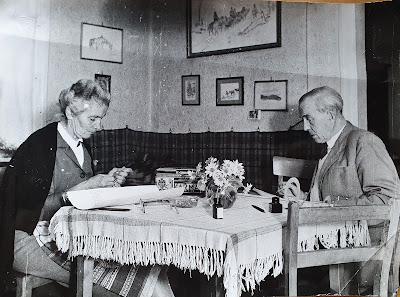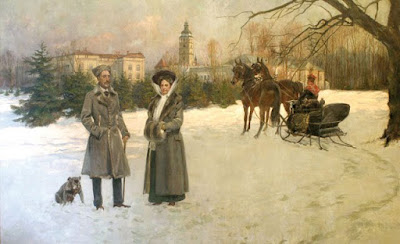Here's my dad, not long after he married my Leeds Irish mum, in the very late 1940s. I wrote about his wartime experiences and those of his family, in a book called The Last Lancer, currently out of print, with a revised edition due to be reprinted later this year.
Britain has gone crazy over immigration. All our media have gone crazy over immigration. It's impossible to turn on the TV or radio, or pick up a newspaper, without getting the impression that the whole country has been flooded with threatening young aliens.
Every time I hear an interview with an angry man or woman advocating drowning or burning the incomers I think of my dear dad. It's not everyone, or even the majority, but as with all senseless and crass hatred, those are the ones that stick.
Dad had been part of the Polish Home Army, the resistance, initially as a young courier in the Polish east, then in the Warsaw Uprising, followed by a spell in a German Labour camp, where he worked in the infirmary. This was followed, after liberation, by some time in Italy, in 'General Anders Army' - essentially part of the British army.
There is no reference to his time in the Home Army in his official papers. This is hardly surprising, because people who had been in the resistance, returning to Poland in the post-war years, were often sent to Gulags, as enemies of communism. Stalin was no friend to Poland. My grandfather was dead at the age of 38, probably of amoebic dysentery, having been imprisoned by the Russians in some hellhole and then released to trek east. He is buried on the Silk Road. My grandmother was believed to be lost, although many years later, the Red Cross facilitated a reunion. She had survived. I often think of her and so many other family members when I watch Doctor Zhivago - each becoming 'a nameless number on a list that was afterwards mislaid.' Dad's much loved Aunt Ludka died in Bergen Belsen just before liberation.
Under 'next of kin' on his army papers, Dad had written a Polish phrase that translates as 'closest family to nobody'.
Julian Czerkawski came to England in 1946 to a Polish resettlement camp near Helmsley in Yorkshire, and was later demobbed to a job in a textile mill in Leeds. The choice initially was mills or mines, and dad chose a mill. He was an 'alien'. Years later, I wrote a poem about that term. You can read it at the end of this post. In my naivety I thought we might be past all that, during those years when we were members of the EU, but it seems that Britain will never ever be past all that.
The camps worked, largely because they were properly organised, that word 'resettlement' being the key, with language classes, gardens, healthcare, education and even visits to nearby halls for dancing. By the 1950s, there were some 250,000 Polish refugees here. Of course this wasn't handled by big private companies, milking the taxpayer for every last pound, which is perhaps why it seemed to work pretty well.
Not long after that, dad met my mum, Kathleen, and was soon absorbed into her large Irish immigrant family. My nana at least knew all about prejudice. These days, people will tell me how much they liked the Poles. How they fitted in. Except that mum told of somebody saying 'Don't you think they should send all those Poles home?' to which my forthright mum replied 'Not really. Seeing as how I've just married one.'
Neal Ascherson writes of a 'packed out rally in the Usher Hall in Edinburgh where a church minister was cheered as he abused Poles as scroungers and Papists.'
Even after I was born, when we were living in a tiny, shabby, two room apartment in central Leeds, whenever a crime was reputedly committed by a 'foreigner', the police would come knocking. Often in the middle of the night. Or they did until one night my mum - with a new baby and a short fuse - went down and told them exactly what she thought of them. They never came back.
Dad went to night school after work, studied, and eventually had a long and distinguished career as a research scientist, contributing to his community, especially once we moved to Scotland, in a great many ways. Today, people still make a point of telling me how much they liked him.
But as I wrote in The Last Lancer, 'we became complacent. Brexit seems, in part at least, to have been facilitated by the same jingoistic resentments of incoming foreigners that caused people to scrawl "Go Home Poles" on walls in the post war period. The skewed perception that it is the poor who take jobs and houses from the poor.'
We are not alone. There are problems with the rise of the far right all over Europe, and - to an even more alarming degree - in the USA.
As brilliant historian Timothy Snyder wrote, 'Strongman rule is a fantasy. Essential to it is the idea that a strongman will be your strongman. He won't. In a democracy, elected representatives listen to constituents. We take this for granted, and imagine that a dictator would owe us something. But the vote you cast for him affirms your irrelevance. The whole point is that the strongman owes us nothing. We get abused and we get used to it.'
I wish those intending to vote Reform in our next election would bear that in mind, but I'm not holding my breath. There will almost certainly be trouble ahead.
I am small in springtime
I can see everything even the
bald patches on the
heads of passing men,
a precarious and thrilling position.
My father’s hair is coal black and curly,
Polish hair as foreign as he is.
The word refugee is as familiar
to me as my own name.
I hold his ears for balance,
while he trots with me aloft.
My father’s papers proclaim him alien
which makes me half alien too.
Poland might as well be Pluto but
the iron curtain is real.
I see it sweeping across Europe
made of polished metal,
dividing kin from kin,
as unfathomable as space.
Small and safe on his shoulders
his hands steadying me,
I grip his ears and laugh.
We are what we will always be
to one another:
complicit and loving
alien invaders of
a mystifying new world.
 |
| Dad on the right, looking into the camera. |




































